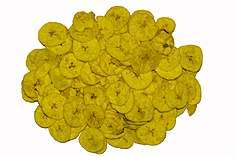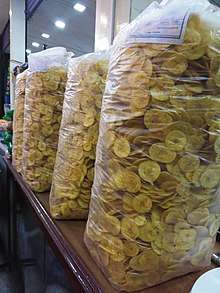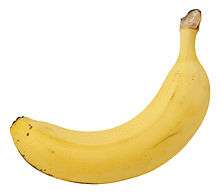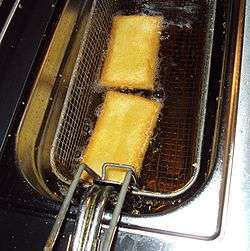Banana chip
 Dried banana chips | |
| Nutritional value per 100g | |
|---|---|
| Energy | 2,170 kJ (520 kcal) |
|
58.40g | |
| Sugars | 35.34g |
| Dietary fiber | 7.7g |
|
33.60g | |
| Saturated | 28.970g |
| Monounsaturated | 1.950g |
| Polyunsaturated | 0.630g |
|
2.30g | |
| Vitamins | Quantity %DV† |
| Vitamin A equiv. |
1% 4 μg |
| Vitamin A | 83 IU |
| Thiamine (B1) |
7% 0.085 mg |
| Riboflavin (B2) |
1% 0.017 mg |
| Niacin (B3) |
5% 0.710 mg |
| Vitamin B6 |
20% 0.260 mg |
| Folate (B9) |
4% 14 μg |
| Vitamin B12 |
0% 0.00 μg |
| Vitamin C |
8% 6.3 mg |
| Vitamin E |
2% 0.24 mg |
| Vitamin K |
1% 1.3 μg |
| Minerals | Quantity %DV† |
| Calcium |
2% 18 mg |
| Copper |
10% 0.205 mg |
| Iron |
10% 1.25 mg |
| Magnesium |
21% 76 mg |
| Phosphorus |
8% 56 mg |
| Potassium |
11% 536 mg |
| Sodium |
0% 6 mg |
| Zinc |
8% 0.75 mg |
| Other constituents | Quantity |
| Water | 4.3 g |
|
| |
| |
|
†Percentages are roughly approximated using US recommendations for adults. Source: USDA Nutrient Database | |
Banana chips are dried slices of bananas (fruits of herbaceous plants of the genus Musa of the soft, sweet "dessert banana" variety). They can be covered with sugar or honey and have a sweet taste, or they can be fried in oil and spices and have a salty or spicy taste.[1]

Banana chips are similar to chifle, usually made from firmer, starchier fruit varieties of the genus Musa commercially called plantains or "cooking bananas".
Fried

Fried banana chips are usually produced from under-ripe banana slices deep-fried in sunflower oil or coconut oil. These chips are dry (like potato chips), contain about 4% water (table), and can be salted, spiced, sugar coated or jaggery coated. Sometimes banana flavoring is added. If ripe bananas are used, they come out oily. They are used for desserts, not for dry chips.
Dried
Some varieties of banana chips can be produced using only food dehydration. Banana slices that are only dehydrated are not dark yellow and crunchy, but rather are brown, leathery and chewy. They are very sweet and have an intense banana flavor. These are ideally made from bananas that are fully ripe. Another kind is made by baking in an oven, although this process may not result in the same intense banana flavor.
Nutrition
Fried banana chips are 4% water, 58% carbohydrates, 34% fat, and 2% protein. In a 100 gram reference amount, fried banana chips supply 519 calories and are a rich source (20% or more the Daily Value, DV) of magnesium (21% DV) and vitamin B6 (20% DV), with moderate amounts of iron, copper, and potassium (10% to 11% DV) (table). Other micronutrients are in negligible amounts.
Uses and variations
India
Fried plantain chips, known as nenthra-kaaya oopperi or upperi in Kerala, are fried in coconut oil.[2] Both ripe and unripe plantains are used for this type of chip preparation. The chips may be coated with masala or jaggery to form spicy and sweet variations. Plain banana and plantain chips are called pachkkaya varuthathu and kaya upperi, respectively; sweet jaggery-banana chips are called sharkara upperi. It is an integral part of the traditional Kerala meal called sadya served during weddings and festivals, such as Onam.
Indonesia
Banana is a native plant of Maritime Southeast Asia and the people of the archipelago has developed many uses of it for ages, including as a snack. In Indonesia, banana chip is called kripik pisang, and is considered as a variant of crispy kripik (traditional chip or crisp). Kripik pisang is a popular crispy snack and can be commonly found in Indonesia, although it seems to be more prevalent in Java and Sumatra.
Usually unripe green bananas are thinly sliced, soaked in lime and salt water solution, and being deep fried as chips.[3] Unripe banana is well suited for deep frying due to its low content of water and sugar, while having high starch content. Pisang goreng is another fried banana snack, although it is not thinly sliced and serves as a sweet hot snack.
America
The chips are often part of muesli and nut mixes. Other chips, such as patacones, are salty. Similar chips called chifle are made from plantains, the family of fruit that bananas come from. In tropical American cultures, all bananas are considered plantains, but not all plantains are bananas. These deep-fried plantain chips are also quite popular in the southeastern part of Mexico, especially in the state of Tabasco.
Gallery
 Fried banana chips
Fried banana chips- Indonesian kripik pisang (banana chips)
See also
- Apple chips
- Banana - In popular culture and commerce, "banana" usually refers to soft, sweet "dessert" Musa cultivars.
- Banana powder
- Chifle - a similar salty snack chip made from plantains.
- Plantain - Musa cultivars with firmer, starchier fruit
- Tostones - a similar salty snack made from plantains.
- Kripik - Indonesian chips, kripik pisang is Indonesian banana chips
- List of deep fried foods
- List of dried foods
References
- ↑ Food processing, EPa. "How to Make Sweet and Salted Banana Chips". Retrieved 16 May 2012.
- ↑ "Banana Chips from Kerala, india". The Hindu. Retrieved 2013-04-13.
- ↑ "banana chips (keripik pisang)". Indonesian original recipe.
| Wikimedia Commons has media related to Banana chip. |

